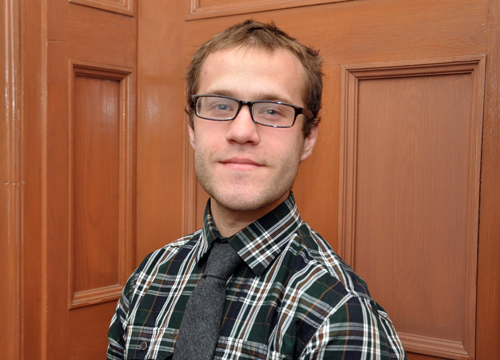
Caring for a family member who is sick, elderly or has a disability can be difficult, especially if you’re a student. As the population ages, a growing number of young people are taking on the added responsibility of caregiving, sometimes at the expense of their studies, part-time jobs or social lives.
Josh LeBlanc knows first-hand what it’s like, having worked for a disability agency as a personal support worker for an individual with a cognitive disability. His family also struggled with the caregiving needs of his grandmother, who was diagnosed with Alzheimer’s disease and died last year.
“You don’t usually associate students with caregiving,” says LeBlanc, a PhD student in the Department of Management. “Due to the way the population is aging, it’s necessary.”
As a student, he says, being a caregiver or knowing that you may need to care for a family member in the future may affect your choice of schools. You may decide to study close to home to save money because you feel financially obligated to help your family with the costs of caregiving.
“When I found out about my grandmother, it affected all aspects of my life,” says LeBlanc. He was a student when his grandmother began to experience signs of dementia. His parents cared for her for as long as they could before hiring a home nurse.
LeBlanc is studying student caregivers and those who may find themselves in a caregiving role in the future. His study group includes students from U of G as well as St. Lawrence University in Canton, New York, and the University of New Haven in West Haven, Connecticut, where he did his bachelor’s and master’s degrees in psychology, respectively.
Most caregivers are middle-aged or older and most are female. That could change, says Leblanc, as more young people take on the responsibility of caregiving — perhaps because no one else in the family is able to do so or because the family can’t afford to hire a personal support worker.
He says caring for someone with special needs was one of the hardest jobs he has ever had but also one of the most rewarding, because he feels it made him stronger. “In terms of my outlook on life, it affected me greatly.”
Instead of looking at caregiving as a form of “stress and coping” as in most previous research, LeBlanc wants to frame it in a positive light. Part of his research looks at how caregiving responsibilities in early adulthood affect resiliency later in life. “Is caregiving something that can benefit people in the long run? I think it does.”
Families may feel compelled to care for their loved ones on their own because long-term care facilities are often filled to capacity and their residents may not receive the best care due to staff shortages. LeBlanc says personal support workers often work long hours for low pay in an environment that puts them at risk of physical abuse by the people they care for.
Caring for aging relatives can also be a financial burden for some families. “It’s extremely costly because a lot of it isn’t covered,” says LeBlanc. Caregiving costs can reach hundreds of thousands of dollars per person in the United States. Some families have even resorted to sending their aging family members to countries where elder care is more affordable, he says.
Although age-related decline is part of life and often takes years to develop, disability can happen instantly to anyone at any time. “It’s not something that the person in that situation asks for,” says LeBlanc. “You can’t possibly relate to this situation until either it happens to you or to someone really close to you.”
A growing number of employers are providing support such as flexible hours and time off to workers who are also caregivers at home, he adds, and universities may need to consider similar accommodations for students. Caregiving has been shown to decrease an employee’s work performance, and he believes the same to be true for students’ academic success, partly because they may need to go home to visit their families more often.
LeBlanc advises student caregivers to continue living their lives the way they want because that’s what the person they’re caring for would want. “They don’t want you to fixate on [their health problems] and have that dictate what you do with your life. They still want you to do things for yourself. They don’t want you to stop living because they’re in a situation they don’t want to be in.”
If you would like to share your caregiving experience with LeBlanc, contact him at leblancj@uoguelph.ca.